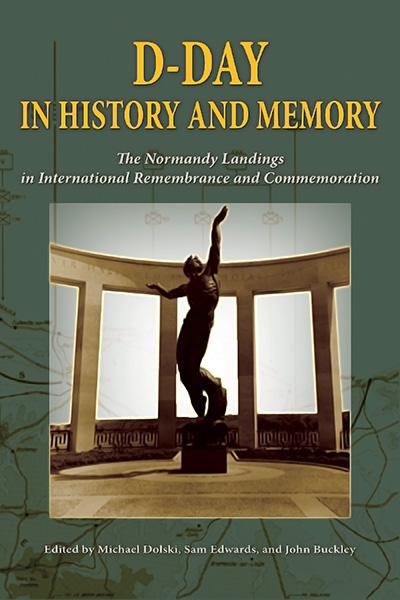
March, 2014
Published
320
Pages
12 b&w photos. 1 map. Notes. Bib. Index.
Features
Ideal for Classrooms
About Dolski et al.'s D-Day in History and Memory
Over the past sixty-five years, the Allied invasion of Northwestern France in June 1944, known as D-Day, has come to stand as something more than a major battle. The assault itself formed a vital component of Allied victory in the Second World War. D-Day developed into a sign and symbol; as a word it carries with it a series of ideas and associations that have come to symbolize different things to different people and nations. As such, the commemorative activities linked to the battle offer a window for viewing the various belligerents in their postwar years.
This book examines the commonalities and differences in national collective memories of D-Day. Chapters cover the main forces on the day of battle, including the United States, Great Britain, Canada, France and Germany. In addition, a chapter on Russian memory of the invasion explores other views of the battle. The overall thrust of the book shows that memories of the past vary over time, link to present-day needs, and also still have a clear national and cultural specificity. These memories arise in a multitude of locations such as film, books, monuments, anniversary celebrations, and news media representations.
“This collection takes readers into how an ‘event’ becomes many events: central to the canonical American narrative about ‘The Great Crusade,’ engaged with mixed feelings by the French, and almost completely written out of the Russian narrative of the war, for example.” —Edward T. Linenthal, author of Sacred Ground: Americans and Their Battlefields
“This is a superb volume.” —G. Kurt Piehler, author of Remembering War the American Way
Classroom Adoption
D-Day in History and Memory: The Normandy Landings in International Remembrance and Commemoration is a recommended text for use in classrooms where the following subjects are being studied: History, Military.
Over the past sixty-five years, the Allied invasion of Northwestern France in June 1944, known as D-Day, has come to stand as something more than a major battle. The assault itself formed a vital component of Allied victory in the Second World War. D-Day developed into a sign and symbol; as a word it carries with it a series of ideas and associations that have come to symbolize different things to different people and nations. As such, the commemorative activities linked to the battle offer a window for viewing the various belligerents in their postwar years. Chapters cover the main forces on the day of battle, including the United States, Great Britain, Canada, France and Germany. In addition, a chapter on Russian memory of the invasion explores other views of the battle. The overall thrust of the book shows that memories of the past vary over time, link to present-day needs, and also still have a clear national and cultural specificity. These memories arise in a multitude of locations such as film, books, monuments, anniversary celebrations, and news media representations.
Adopted By
[“Arizona State University for "World War II Today"”]
About the Editor
MICHAEL DOLSKI is a historian with the U.S. Joint Prisoner of War—Missing in Action Accounting Command’s Central Identification Laboratory.
SAM EDWARDS is a Lecturer in American History at Manchester Metropolitan University.
JOHN BUCKLEY is a Professor of Military History at the University of Wolverhampton.
Buy Now
D-Day in History and Memory: The Normandy Landings in International Remembrance and Commemoration
320 pp. 12 b&w photos. 1 map. Notes. Bib. Index.